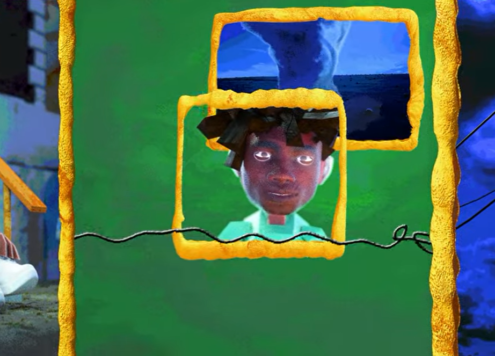Out of Pennsylvania, the young Kenyan-born musician is making quite a ruckus. After making a move to NY, he began capturing the attention of audiences with a direct punk-inspired sound of old. The artist, simply known as binki, rocks through his debut release, the Motor Functions EP (Fader Label), four songs that deliver quick-paced rhythms of punk enthusiasm with loads of pop sensibilities. The sound of “Clay Pigeons” is considerably English, but it’s a UK inspiration further south of the millennium with more pop hooks than anything a Buzzcock could probably deliver. Ok, maybe I’m stretching the truth there a bit but the rhythm and melody are infectious and binki seems to enjoy himself throughout. On “Landline” I’m not sure if the bassline is more Simon Gallup or Peter Hook, or maybe it’s an amalgamation of both, as guitar notes rally right over that bottom end, with an addictive chorus. As the song fades away, it becomes clear where his analog fascination lies. The curious “Revolve” fans pop flames, wrapped around mechanical beats, and thick bassline fans are liable to trip over themselves on. Closing with “Invisible Fence,” binki utilizes space and dynamics a bit more with the programmed beat and wall of instrumentation. He clearly knows how to utilize melodies. The only regret held for this release is that it’s only an EP.
What is pop music? What is guitar pop? Well, that depends on a few things but for Jackie Hayes, she follows a long line of artists who sling guitars and are comfortable relaying cute pop inflictions. Listening to her five-song selection of There’s Always Going To Be Something I’m left…wanting. I think I want more and that ‘more’ is probably a hook that I can grab onto but instead it’s more of a hook on my uncle’s line, catching fish that are writhing painfully trying to swim away. But the release isn’t without any good merits, with “Have Fun” wrapped around an infectious and flagrantly bouncy beat that’s scintillating with a melody that does the trick here. Even the closing “Sunday,” with its controlled rhythm stands firm, much like soldiers marching in unison, directed by an astute sergeant in Jackie Hayes. But with less then half of the tracks capturing my attention, I don’t know, I’m still left…wanting. The young Chicago artist still has room to learn, grow, and find her place so we shouldn’t write her off.
Sometimes you’re stuck on repeat, having to clarify how one never knows everything about everyone. If someone feigns knowledge about some musical entity out of Mongolia that’s created the perfect album, they’re probably lying. But people aren’t always familiar with every release that drops, every artist literally making waves. That’s just a fact and if anyone tells you different (ahem) then they’re probably lying.
M.A.G.S., the alias for Los Angeles-based Elliot Douglas, does come as a surprise. After releasing a couple of singles and videos recently, he’s followed with a new album in Say Things That Matter (ONErpm), a densely populated album rife with catchy songs that seem to err on the side of pop experimentation rather than open directness. But of course, anyone can appreciate the challenge of the album that operates haphazardly, and always landing perfectly square on musical feet. That in itself is no easy task, but let’s start at the beginning. With an easy-listening “Intro,” seemingly taken off an 8-track deck, M.A.G.S. can get down with guitar melodies over electronic drum patterns as easily as he can through organic ones on “Smile” where his guitars play war games and quickly capture the flag. The consistent sputtering guitars make way for catchy rhythms and vocally, he’s on point, squeezing every bit of sweetness with his cadence. It gets your attention. Quickly! Within 4-minutes he’s able to toss around harmonies with the swiftest of ease.
There are some things M.A.G.S reminds me of but we’ll just leave it at indie rock’s heydays of magical moments when artists put it more than just good songs but their own stamp of authenticity. “Wait” explodes consciously with just a few clean chords, and M.A.G.S.’ penchant for cleverly skewered pop-punk melodies with Jams-like fervor, but never relinquishing his own identity in the process. It’s only matched by the songwriting, which moves in varying directions in just under 4-minutes. But M.A.G.S. isn’t a one-trick pony, offering up a wide array of sounds through Say Things That Matter. The sugary poppiness of “Golden” is utterly magical as the song drips, or rather, oozes with an atmospheric sensuality no doubt accentuated by the guitars that surround the song itself. Or it could be M.A.G.S.’ echoey vocals, either way, it’s more than inviting while “Beachlove” takes things into that atmosphere even further. More harmonies are included, attaching themselves to soaring melodies. The great thing about this album is the inclusion we get of just so much. M.A.G.S. can turn a simple pop song into so much more. “Beg” plucks on a few guitar notes as he sings all over it and changes the dynamics after a minute in. It’s seamless and will leave you floored.
Simply put in layman’s terms though, M.A.G.S. is that ill shit creating pop gems effortlessly and there aren’t many that can stand next to him, claiming the same. Say Things That Matter offers a multitude of statements that we should all want to listen to because M.A.G.S. probably doesn’t know that he’s a master at his craft.
Facebook | Twitter | Instagram
It isn’t difficult to fathom that bands come and go. Once a group dissolves, the members go in separate directions, often creating new start-up bands and taking off again. It happens. A lot. There are a variable number of reasons as to why it may happen, but sometimes, you just have to go back home again, to where it all began. That happens sometimes too.
If there was one thing that could be said about the post-hardcore band Quicksand, whether you loved or hated them, the band always seemed to have everyone’s respect. The NY group that holds ties to hardcore acts (Gorilla Biscuits, Burn, Youth of Today) delivered a beast of an album in its ’93 debut full-length Slip, followed up by ‘95’s Manic Compression before it folded under the pressure of its own weight. Frontman Walter Schreifels played in a few groups (Rival Schools, Walking Concerts, the short-lived World’s Fastest Car w/ Artie Shepard) since, and the band reformed in 2017 as a 3-piece releasing Interiors, which saw the group falling back into place comfortably. But as I mentioned, Quicksand always had respect and after four years it’s regrouped once again for Distant Populations (Epitaph). With the band’s latest offering, it doesn’t bang listeners over the head attempting them all to submit. Nope, the band has learned that milking melodies from track to track is worth its weight in gold, and it’s plentiful here.
From the get-go, Distant Populations literally strikes an internal chord/cord at every turn. “Inversion” gets everyone’s attention, hit with a cacophony of melodicism through its loud guitars with a mid-tempo, ever-pummeling drum track. Ears are definitely perked and curiosity is piqued. From this point on the band leads into “Lightning Field;” one of the most memorable songs this year. The track’s quick pace, urging melodies, and repetitive nature of over-the-top guitars allow for anthemic qualities here. It may be repetitive but it’s not repetitious, there’s a difference. But Quicksand isn’t just about raucously loud guitar rock, there’s much more to the band, allowing it to steer away from one-dimensionality. Take “Brushed” for example. The song kicks off with tightly recorded drums, a vibrato guitar, bass, and unexpected acoustic guitar strumming. Oddly enough, it’s fitting as the band builds around Schreifels’ vocals, ebbing & flowing expansively. The drumming shift as that expanse reaches atmospheric heights Imagine if you will a box unfolding, unraveling, changing its dimensions, changing into an origami-like flower. That’s the easiest way to describe it. It’s brilliant. But this doesn’t mean the group eschews what it does best.
“Missile Command” has that gradual build-up that you know will explode at the right time. The band takes its time but when the group hits it, it’s unexpected. I just didn’t time that right and Quicksand is obviously keeping listeners on their toes. Sonically, I’m not certain why the group never found a wider audience because the members destroy everything in their path, as a unit, without even trying. But the band cleverly wraps around that sonic capability around wondrous pop songs like “Phase 90” without relinquishing its own identity. Shit, “EMDR” is a beast of a track where the band plays with loud rhythms and repetition for something grandiose with arena rock qualities. It’s heavy with nods to classic rock fuckery but level-headed enough to be a classic all its own.
Again, I’m stuck on stupid attempting to figure out how the ignorance of music listeners had pushed Quicksand to the wayside. Unless… it’s only taken this long for the rest of the world to catch up to what they’re doing, what they’ve done. Many with much less skill have basked in the limelight, but even if it never happens for Quicksand just know this: Distant Populations is that sound of music & skill many will never achieve. The band’s brilliance is in its ability to adapt without changing who they are or what they do.
Facebook | Twitter | Instagram
As we all maneuver carefully selecting books, art, and music to listen to, they all convey something special so why wouldn’t we be very particular in what we allow into our very essence. Sometimes we don’t have that luxury and are bombarded by a variety of mediums, so much that we need to step back and again, try to be selective. We just can’t let anything in all the time, right?
Enter: Happy Pill, a North Carolina group led by Adam Fenton, who – and proper discloser is warranted – writes interesting music that is pretty damn good. The songs are put together pretty well, with nary a negative tone about them. But there’s just one glaring problem I’ve found throughout the 14 songs compiled here and it’s something that happens often to bands; with Life Story we have songs that could probably be broken apart into a couple of releases. If you told me they were two different bands, I’d probably believe it.
The band opens with its “Intro,” which sounds like a group counseling session set to music, and what follows is the cooing “Stayin Home.” Now here the mood shifts into a poppy & ethereal mode with a mood that’s airy and direct. While there’s absolutely no problem with the track, it’s followed by the pop R&B soulfulness of “Describe The Light,” which is a head-nodding banger of a track that leaves me confused here. The signs are evident from the start; Life Story is going to be a confusing ride. And it somewhat it. The acoustically driven “See Thru,” with lilting vocals and its twee-pop sound moves in dreamy soundscape territory as walls of guitar wail in the background while the Lite FM jazziness of “Crossed My Mind” obviously takes a different approach. You get the idea here and I just wish there was a clear path Happy Pill would take with this album.
Don’t get me wrong here, Life Story is filled with clear-cut musicianship but if anyone were to ask how to classify the band, it would be a pain-staking attempt to place Happy Pill anywhere specific. We understand that some would rather find their own place but it’s difficult when something genre hops in too many directions to fit into any one.
Facebook | Twitter | Instagram











Social Media